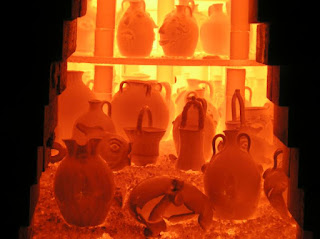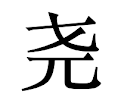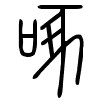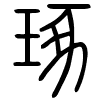The big seal script of character Rich is
The left is character Eat (Post 190), which is also Food as a noun. The right part is character Emperor Yao (Post 612). If you were a kiln worker of making bricks in ancient time (3000+ years ago), you were doing the most advantaged technical job, you could make big money, therefore you had enough and good foods to eat, the life only rich people could enjoy at that time.Wednesday, August 30, 2023
Amazing Chinese Characters (615) Rich - 饶(饒)
Amazing Chinese Characters (614) Pour - 浇(澆)
The big seal script of character Pour is
The left is character Water (Post 13), the right is character Emperor Yao (Post 612), meaning is to make bricks. The bricks are made in kiln by fire, how to control the temperature to avoid too high temperature over burning the bricks and the kiln? Ancient Chinese used water on the top of the kiln where a circle ditch was full of water all the time in the brick making process. The character shows that people pour the water on kiln. When and how much to pour water on the ditch are important, which needs experience, especially for pottery products. It is not so critical for burning bricks, normally just keep the ditch with water since some time point.Amazing Chinese Characters (613) Burn - 烧(燒)
The big seal script of character Burn is
The left is character Fire (Post 26), the right is character Emperor Yao (Post 612). Using fire to burn the adobe bricks is Burn. Later on all using fire to burn something like pottery are Burn.
The small seal script of character Burn is
Similar to big seal script.
Clerical script of character Burn is
Similar to older scripts.Tuesday, August 29, 2023
Amazing Chinese Characters (612) Emperor Yao - 尧(堯)
The shell bone script of Emperor Yao (2324 - 2255 BC) is
The top are three characters of Soil (Post 223), the bottom is character Unexpected (Post 611). What is this? It is an ancient kiln as the one below,Friday, August 25, 2023
Amazing Chinese Characters (611) Unexpected - 兀
The shell bone script of character Unexpected is
a person with a head top flat (not the head being cut off). A person without head is very strange, unexpected. Sometimes, people bend head very low, or hold something on shoulder, blocking the head, other people may not see the head from far or in the dark.Tuesday, August 15, 2023
Amazing Chinese Characters (610) Peck - 啄
The big seal script of character Peck is
The left is character Mouth (Post 16), the right is character Skeleton (Post 607). The meaning of the character is that a bird uses its hard beak to peck food, like woodpecker pecks tree to get insects.
The small seal script of character Peck is
Thursday, August 10, 2023
Amazing Chinese Characters (609) Carve - 琢
The big seal of character Carve is
The left is character Jade (Post 244), the right part is character Skeleton (Post 607), here it means very hard and sharp knife used to carve Jade.Amazing Chinese Characters (608) Large Grave - 冢
The bronze script of character Large Grave is
Amazing Chinese Characters (607) Skeleton - 豖
The shell bone script of character Skeleton is
One dot on the left and one
which is shell bone script of character Pig (Post 111).
The original meaning of the character is the Pig Leg Bone, the dot indicates the lower part of the pig.
The small seal script of the character Skeleton is
One short line crosses three legs of the pig. Let's see the corresponding small seal of PigFriday, August 4, 2023
Amazing Chinese Characters (606) Open - 启(啟)
The shell bone script of character Open is
The top left is character Household - 户 (Post 271), meaning a single door. The top right is a hand opening the door. The bottom looks like character Mouth - 口(Post 16). It is believed that the first character had no Mouth. The meaning of the character is to Open the door. Later, the Mouth - 口 was added to mean "Teaching, Guiding for Beginners", open a door for skills and knowledge.
The big seal script of character Open is
Similar to shell bone script.Amazing Chinese Characters (703) Axe - 斧
The shell bone script of character Axe is It looks like a modern axe. However, the above shell one script only listed in 《在线汉语字典》(The Online...

-
This post has been collected in book "Learn Chinese from Pictography" published on Amazon. You could find it by clicking the follo...
-
Chinese is difficult to learn, which is not true. Actually, Chinese characters are very pictography, or ideogram. Learning Chinese should be...
-
The big seal script of character Plow is The left is character Rake, the right is character Well, the dot in the middle of the square is an...



















































